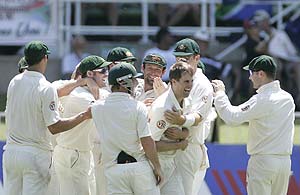Travis Head obliterates RCB in record breaking century... and just wait for the celebration!
RCB have suffered a massive HEAD-ACHE after Travis Head smashed the fastest century by an SRH player in just 39 balls, as they amassed…

Simon Katich was – and deserves the opportunity to continue to be – one of those unobtrusive types of Test openers, who doesn’t catch the eye by thrashing the bowling to all parts, but always seems to be there or thereabouts.
You have to wonder if that isn’t an extremely good quality to have in an opener, making it worth seeing whether he still has that ability before making the decision that his Test career is over (if indeed that is what not getting a Cricket Australia contract means).
A lot of people have been saying how good his returns have been over the past three years. I thought it was worthwhile seeing whether that was right. So let’s start with the Indian tour at the start of 2008/9.
Since then, he played 30 Tests, missing only the last three Ashes Tests and one other.
He batted in 56 innings, three of them not-out. One of those not-outs was the unusual feat of carrying his bat through the innings (131 v NZ in 2008). That was his highest score in that period, out of a total of six hundreds.
What stands out from his figures is the consistency. There were only three of those 30 games in which he failed to get to 20 in either innings of the game, one more in which he failed to get at least a 30, two more where he didn’t get a 40 and four more where he didn’t get a 50, making a total of 10 games where he “failed” to get to 50 (and noting that those 10 games include three of the four games where he only had one hit).
To be fair, it has to be admitted that four of those 10 fifty-less games came in his last 5 games, and three of his seven single-figure scores came in his last four games, so you might argue there was some degree of tailing-off going on.
However, it’s an open question whether he actually “failed” in all those 10 games without a 50.
Hitting a 50 is commonly regarded as something of a pass mark. Why? What’s the real difference between Katich’s even 50 in the first innings of the last Brisbane Ashes test and his 43 in the Adelaide second innings (his last Test innings to date)?
A handful of runs certainly, but not much beyond that. Both were under pressure of different sorts – one was the first innings of the series, after England had posted a moderate score, when a good score could set Australia off on the right foot to win the game and for the whole series.
The second was after a massive and demoralising England innings, where any faint hopes of survival required someone to just stay in.
In both, he batted for a session or more, and saw off the new ball and opening bowling spells.
As an opener, that’s doing the fundamentals of the job – I think you can argue that if an opener does those things, he’s done a good job, almost regardless of how many he’s scored himself.
I’d suggest that for an opener getting to 30 is a more realistic rule of thumb pass mark. At that point, most of the time you’ll be through the first hour, having batted for around 20 overs, the ball won’t be brand-new and one or both of the opening bowlers will be out of the attack.
If you accept that, Katich starts to look very, very consistent indeed. He achieves at least a 30-run “pass” two innings out of three (discounting two short not out innings), and in at least one innings in 26 of his 30 games played (including in his last four).
Even if you choose to set the pass bar at 50, he still manages a very competitive 23 out of 54 innings (again leaving out the short not-outs) and a very, very good 20 matches out of 30.
All of that boils down to saying that with Katich opening, you could reasonably hope that he’d give you at least a start in one innings of pretty much every game and get you a 50 in better than two games out of three.
Let’s see what performances he and others put on the board in Shield cricket before finalising the Test team – but his record to date must demand that he’s at least in the reckoning.